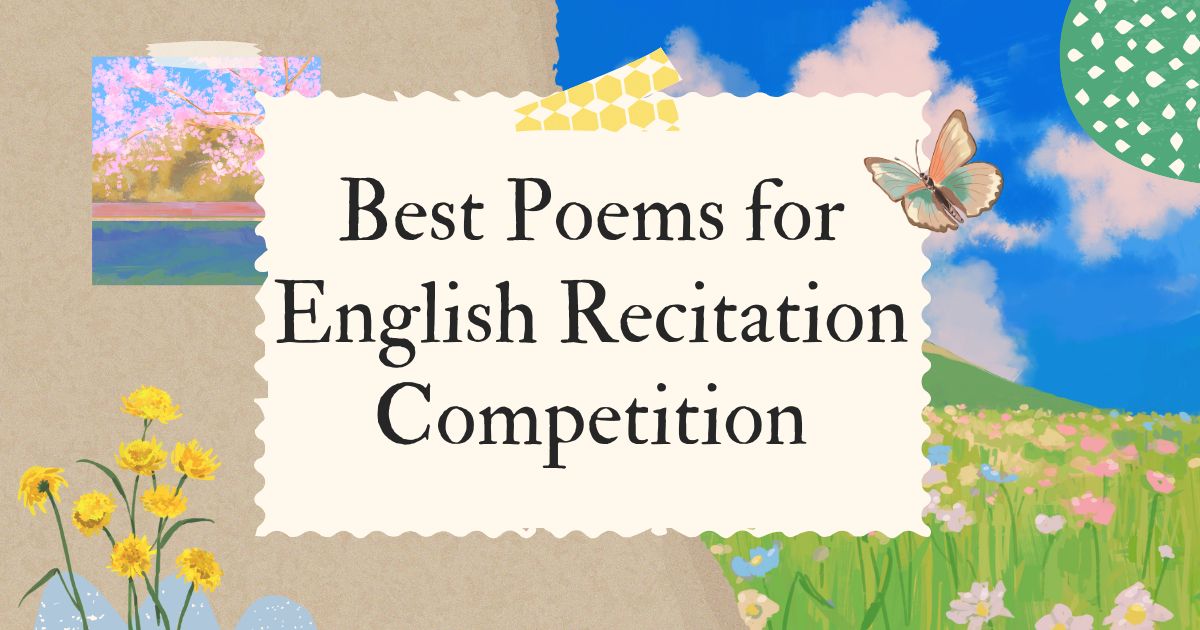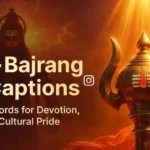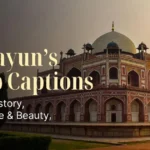Best Poem
You’re standing at the threshold of competitive poetry recitation, where your voice becomes the vessel for literary masterpieces that have stirred souls for centuries.
Selecting the perfect poem for English recitation competition isn’t merely about beautiful words—it’s about discovering verses that amplify your unique delivery style while mesmerizing judges and audiences alike.
These carefully curated poems for recitation competitions offer diverse themes, rhythmic patterns, and emotional depths that transform performances from mundane to magnificent.
If— by Rudyard Kipling
“If you can keep your head when all about you
Are losing theirs and blaming it on you,
If you can trust yourself when all men doubt you,
But make allowance for their doubting too…”
Kipling’s masterpiece for English recitation stands as one of the most beloved competitive recitation poems ever penned. The conditional structure creates natural pauses that allow reciters to build dramatic tension while delivering life’s most profound wisdom.
This poem works exceptionally well for English poetry competitions because its rhythmic cadence mirrors conversational speech, making memorization surprisingly manageable despite its length.
The beauty of “If—” lies in its universal appeal—judges from diverse backgrounds connect with its timeless advice about resilience, integrity, and balanced perspective. Advanced reciters appreciate how each stanza builds upon the previous one, creating opportunities for vocal modulation and gestural emphasis.
The poem’s performance-friendly structure allows speakers to demonstrate range, from quiet contemplation during “if you can dream—and not make dreams your master” to triumphant declaration in the final lines about becoming “a Man, my son!
More Post: The 30+ Best Hindi Poems of All Time: A Journey Through India’s Literary Soul
The Road Not Taken by Robert Frost
“Two roads diverged in a yellow wood,
And sorry I could not travel both
And be one traveler, long I stood
And looked down one as far as I could…”
Frost’s deceptively simple narrative poem conceals layers of complexity that make it ideal for sophisticated English recitation performances. The conversational tone invites intimate connection with audiences, while the deeper philosophical implications about choice and regret provide substance for judges seeking intellectual depth.
This competition-winning poem offers multiple interpretation angles—optimistic celebration of individuality or melancholic reflection on missed opportunities.
The poem’s structure supports natural breathing patterns, crucial for nervous competitors. However, successful reciters avoid the trap of oversimplifying its meaning. The famous final lines “I took the one less traveled by, / And that has made all the difference” require nuanced delivery that acknowledges both triumph and wistfulness.
Expert recitation coaches often recommend this piece for competitors who excel at subtle emotional expression rather than dramatic theatricality.
Invictus by William Ernest Henley
“Out of the night that covers me,
Black as the pit from pole to pole,
I thank whatever gods may be
For my unconquerable soul.”
Few poems for English competitions pack more motivational power than Henley’s defiant declaration of human resilience. Written while the poet endured tuberculosis and amputation, “Invictus” transforms personal suffering into universal inspiration.
The Latin title meaning “unconquered” sets the tone for a performance piece that demands confident, unwavering delivery.
This recitation competition favorite works particularly well for speakers who can convey strength without aggression. The poem’s short length—just sixteen lines—allows for intensive memorization and perfect enunciation of each powerful phrase.
Successful performers emphasize the contrast between external circumstances (“night that covers me,” “bludgeonings of chance”) and internal fortitude (“unconquerable soul,” “I am the master of my fate”). The final couplet provides one of literature’s most quotable conclusions, leaving audiences with lasting impact long after the performance ends.
Daffodils by William Wordsworth
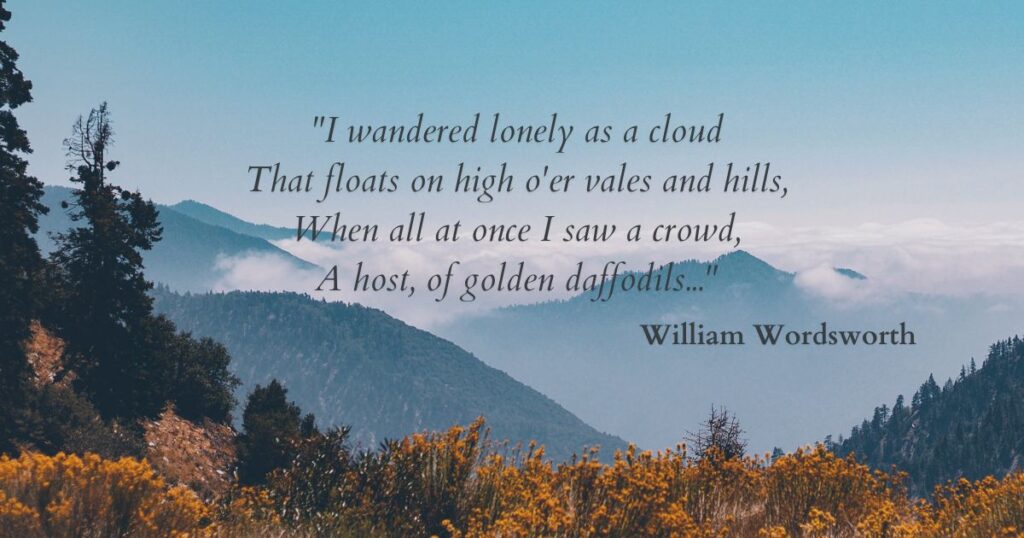
“I wandered lonely as a cloud
That floats on high o’er vales and hills,
When all at once I saw a crowd,
A host, of golden daffodils…”
Wordsworth’s celebration of nature’s restorative power offers English recitation competitors an opportunity to demonstrate descriptive storytelling abilities. The poem’s journey from solitude to joy mirrors many audience members’ experiences, creating immediate emotional connection.
This classic competition piece rewards performers who can paint vivid mental pictures through vocal variation and carefully timed pauses.
The challenge lies in avoiding monotonous sing-song delivery that plagued countless school recitations. Skilled performers treat each stanza as a distinct movement—opening solitude, sudden discovery, joyful observation, and reflective conclusion.
The famous phrase “dancing in the breeze” invites subtle physical expression, while “my heart with pleasure fills, / And dances with the daffodils” provides a triumphant emotional crescendo. Poetry competition judges consistently appreciate performers who balance Wordsworth’s romantic idealism with genuine personal connection to his nature imagery.
More Post:Where Can I Publish My Poems / Your Poetry Published in 2025
Still I Rise by Maya Angelou
“You may write me down in history
With your bitter, twisted lies,
You may trod me in the very dirt
But still, like dust, I rise.”
Angelou’s powerful anthem of resilience and dignity stands among the most impactful poems for English recitation competition in contemporary literature. The repetitive refrain “I rise” creates natural performance rhythm while building to overwhelming emotional crescendo.
This piece demands confident delivery—hesitant performers diminish its transformative power, while those who embrace its boldness create unforgettable competitive recitation moments.
The poem’s strength lies in its progression from defiance to celebration. Early stanzas challenge oppression with sharp questions: “Does my sassiness upset you?” Later verses transform into joyful proclamation: “I’m a black ocean, leaping and wide.
” Advanced recitation competitors appreciate how Angelou blends personal experience with universal themes of overcoming adversity. The piece requires emotional range—from controlled anger to explosive joy—making it ideal for performers comfortable with dramatic interpretation and powerful vocal projection.
The Raven by Edgar Allan Poe
“Once upon a midnight dreary, while I pondered, weak and weary,
Over many a quaint and curious volume of forgotten lore—
While I nodded, nearly napping, suddenly there came a tapping,
As of some one gently rapping, rapping at my chamber door…”
Poe’s gothic masterpiece represents the pinnacle of English poetry recitation for performers seeking to demonstrate technical mastery and atmospheric creation. The poem’s internal rhyme scheme and alliterative patterns create hypnotic rhythm that, when properly executed, mesmerizes audiences completely.
However, this challenging competition piece demands extensive preparation—the slightest stumble destroys its carefully constructed musical effect.
The escalating psychological tension from curious inquiry to desperate pleading provides natural dramatic arc for competitive performance. Each repetition of “Nevermore” requires different emotional coloring, from mysterious intrigue to final despair.
Expert recitation judges recognize the difficulty of maintaining Poe’s intricate sound patterns while conveying genuine emotion rather than mechanical recitation. Successful performers create distinct vocal characterization for both narrator and raven, using pace variation to build supernatural atmosphere that culminates in the narrator’s psychological breakdown.
Do Not Go Gentle Into That Good Night by Dylan Thomas
“Do not go gentle into that good night,
Old age should burn and rave at close of day;
Rage, rage against the dying of the light.
Though wise men at their end know dark is right…”
Thomas’s villanelle about confronting mortality offers English recitation competitors one of poetry’s most emotionally demanding pieces. The rigid form—nineteen lines with only two rhymes and repeated refrains—creates hypnotic intensity when performed with precision.
This advanced competition poem requires performers to find fresh meaning in repetition, as the refrains “Do not go gentle into that good night” and “Rage, rage against the dying of the light” appear multiple times.
The poem’s power emerges from its contradiction between acceptance and rebellion, philosophical wisdom and raw emotion. Thomas wrote it for his dying father, infusing personal anguish into universal themes about aging and death.
Successful competitive performers navigate between gentle pleading and fierce exhortation, treating each stanza’s different character types—wise men, good men, wild men, grave men—as distinct voices unified by shared human defiance. The piece demands maturity from young performers, as superficial delivery cannot capture its profound emotional complexity.
How Do I Love Thee? by Elizabeth Barrett Browning
“How do I love thee? Let me count the ways.
I love thee to the depth and breadth and height
My soul can reach, when feeling out of sight
For the ends of being and ideal grace…”
Browning’s Sonnet 43 remains among the most recognizable love poems for English recitation competition, offering performers an opportunity to explore passionate devotion through precise technical execution.
The Petrarchan sonnet form provides natural performance structure—the octave poses the question and begins enumeration, while the sestet intensifies and concludes the declaration. This classic competition piece rewards reciters who can convey sincere emotion without melodramatic excess.
The poem’s challenge lies in its abstract language and spiritual imagery. Phrases like “to the level of every day’s / Most quiet need, by sun and candle-light” require careful interpretation to maintain audience connection.
Experienced recitation coaches recommend treating each “I love thee” as building toward greater intensity rather than mechanical repetition. The final lines referencing death and afterlife provide opportunities for profound emotional depth, transforming what might seem like simple love poem into meditation on eternal devotion that transcends mortal limitations.
The Lady of Shalott by Alfred Lord Tennyson
“On either side the river lie
Long fields of barley and of rye,
That clothe the wold and meet the sky;
And thro’ the field the road runs by…”
Tennyson’s narrative masterpiece offers ambitious English recitation competitors an epic storytelling challenge spanning 171 lines of medieval romance and tragedy. The poem’s ballad meter creates hypnotic rhythm perfect for sustained performance, while its progression from mysterious setup through romantic awakening to tragic conclusion provides natural dramatic arc.
This advanced competition selection demands stamina, vocal variety, and ability to maintain audience engagement throughout extended narrative.
The Lady’s transformation from passive observer to active participant resonates with modern audiences despite Victorian setting. Skilled performers create distinct vocal characterizations for the Lady’s different phases—detached weaver, awakening woman, desperate lover.
The famous lines “The curse has come upon me,” cried / The Lady of Shalott” require careful buildup and dramatic delivery without melodramatic excess. Competition judges appreciate reciters who balance Tennyson’s ornate language with clear storytelling, making this complex narrative accessible while preserving its poetic beauty and symbolic depth.
Phenomenal Woman by Maya Angelou

“Pretty women wonder where my secret lies.
I’m not cute or built to suit a fashion model’s size
But when I start to tell them,
They think I’m telling lies…”
Angelou’s celebration of inner beauty and confidence provides English recitation competitors with a powerful vehicle for exploring themes of self-acceptance and feminine strength.
The poem’s conversational rhythm and repetitive structure make memorization manageable while building to triumphant declaration of self-worth. This empowering competition piece works particularly well for performers who can convey genuine confidence without arrogance.
The repeated phrase “I’m a woman / Phenomenally. / Phenomenal woman, / That’s me” serves as both structural anchor and emotional crescendo. Each stanza builds the case for valuing inner qualities over conventional beauty standards, culminating in celebration of authentic feminine power.
Advanced performers recognize that this poem requires lived experience or deep empathy to avoid superficial delivery. The piece rewards speakers who can connect Angelou’s specific experience with universal themes about self-confidence, personal magnetism, and the power of embracing one’s authentic self regardless of societal expectations.
Stopping by Woods on a Snowy Evening by Robert Frost
“Whose woods these are I think I know.
His owner lives in the village though;
He will not see me stopping here
To watch his woods fill up with snow…”
Frost’s deceptively simple meditation on duty versus desire offers English recitation performers a masterclass in subtlety and suggestion. The poem’s perfect rhyme scheme (AABA BBCB CCDC DDDD) creates interlocking musical structure that rewards precise delivery, while its surface simplicity conceals deeper meanings about mortality, responsibility, and temptation.
This sophisticated competition choice separates skilled performers from those who mistake accessibility for lack of depth.
The famous final lines “And miles to go before I sleep, / And miles to go before I sleep” demand interpretation that acknowledges both literal journey and metaphorical life obligations.
Expert recitation coaches emphasize the importance of creating winter atmosphere through vocal tone and pacing while avoiding oversimplified delivery that ignores the poem’s philosophical undertones.
Successful performers capture the speaker’s momentary temptation to abandon worldly duties for natural beauty, then resolve to continue their journey with renewed sense of purpose and responsibility.
Sea Fever by John Masefield
“I must go down to the seas again, to the lonely sea and the sky,
And all I ask is a tall ship and a star to steer her by,
And the wheel’s kick and the wind’s song and the white sail’s shaking,
And a grey mist on the sea’s face, and a grey dawn breaking…”
Masefield’s maritime adventure poem provides English recitation competitors with opportunities to demonstrate vocal rhythm and atmospheric creation. The poem’s anapestic meter mimics ocean waves, while its catalog of nautical imagery invites performers to paint vivid mental pictures through descriptive delivery.
This dynamic competition piece rewards reciters who can convey both literal seafaring adventure and metaphorical yearning for freedom and exploration.
Each stanza’s opening “I must go down to the seas again” creates structural repetition that builds intensity while allowing for vocal variation. The poem’s sensory details—”wheel’s kick,” “wind’s song,” “white sail’s shaking”—provide natural opportunities for gestural emphasis without overwhelming the text.
Successful competitive performers treat this as both adventure story and spiritual quest, recognizing that the sea represents escape from conventional land-bound existence. The final image of “quiet sleep and a sweet dream when the long trick’s over” acknowledges that even adventurous spirits ultimately seek peaceful conclusion to their journeys.
The Charge of the Light Brigade by Alfred Lord Tennyson
“Half a league, half a league,
Half a league onward,
All in the valley of Death
Rode the six hundred…”
Tennyson’s commemoration of military sacrifice during the Crimean War offers English recitation performers a powerful exploration of duty, courage, and tragic heroism. The poem’s galloping rhythm mimics cavalry charge while building toward inevitable catastrophe, creating natural performance tension between excitement and dread.
This challenging competition piece demands vocal stamina and ability to maintain rhythmic precision while conveying emotional complexity of celebrating doomed bravery.
The repeated phrase “Rode the six hundred” serves as both structural refrain and diminishing countdown as casualties mount throughout the battle. Advanced performers recognize that this poem requires balance between admiration for military valor and acknowledgment of war’s senseless waste.
The famous line “Theirs not to reason why, / Theirs but to do and die” encapsulates the poem’s central tension between unquestioning obedience and human tragedy. Competition judges appreciate reciters who can honor the soldiers’ sacrifice while acknowledging the political failures that led to their deaths.
Ozymandias by Percy Bysshe Shelley
“I met a traveller from an antique land,
Who said—’Two vast and trunkless legs of stone
Stand in the desert… Near them, on the sand,
Half sunk a shattered visage lies, whose frown…”
Shelley’s meditation on the transience of power provides English recitation competitors with a perfect example of how great poetry distills universal themes into precise imagery. The sonnet’s frame narrative—traveler’s report of ancient ruins—creates natural performance structure while building toward devastating ironic revelation.
This intellectually sophisticated competition piece rewards performers who can maintain narrative clarity while building toward the poem’s crushing final image.
The contrast between Ozymandias’s boastful inscription “Look on my Works, ye Mighty, and despair!” and the surrounding “lone and level sands” requires careful vocal interpretation to achieve maximum ironic impact.
Skilled reciters create distinct voices for narrator and traveler while building tension toward the revelation of empty desert where great works once stood. The poem’s brevity—just fourteen lines—demands precision in every word, making it ideal for competitors who excel at concentrated dramatic effect rather than sustained narrative performance.
Annabel Lee by Edgar Allan Poe
“It was many and many a year ago,
In a kingdom by the sea,
That a maiden there lived whom you may know
By the name of Annabel Lee…”
Poe’s haunting ballad of love transcending death offers English recitation performers an opportunity to explore themes of obsession, loss, and eternal devotion. The poem’s sing-song rhythm and repetitive structure create hypnotic effect when properly delivered, while its progression from happy memory to tragic loss to defiant assertion provides natural emotional arc.
This atmospheric competition piece works best for performers comfortable with dark romantic themes and supernatural elements.
The repeated phrases “In a kingdom by the sea” and “my beautiful Annabel Lee” serve as musical refrains that unify the narrative while building emotional intensity. Advanced performers recognize that the speaker’s continued devotion verges on unhealthy obsession, adding psychological complexity to what might seem like simple love story.
The final image of lying “by the side of my darling—my darling—my life and my bride, / In her sepulchre there by the sea” requires delicate balance between romantic devotion and macabre fixation, challenging reciters to convey both love’s beauty and its potential destructiveness.
Desiderata by Max Ehrmann
“Go placidly amid the noise and haste,
and remember what peace there may be in silence.
As far as possible without surrender
be on good terms with all persons…”
Ehrmann’s prose poem of life wisdom provides English recitation competitors with an opportunity to deliver practical philosophy through measured, contemplative performance. The piece’s gentle counsel and universal applicability create immediate audience connection, while its accumulated wisdom requires mature interpretation to avoid superficial delivery.
This inspirational competition choice rewards performers who can convey genuine conviction rather than mere platitude recitation.
The poem’s structure builds from specific behavioral advice toward broader philosophical reflection, culminating in the famous conclusion “you are a child of the universe, no less than the trees and the stars; you have a right to be here.”
Skilled performers treat each section as building blocks of wisdom while maintaining conversational intimacy throughout. The challenge lies in avoiding preachy tone while conveying sincere belief in the poem’s optimistic worldview.
Competition judges appreciate reciters who can make familiar wisdom feel fresh and personally meaningful rather than recycled inspiration.
The Highwayman by Alfred Noyes
“The wind was a torrent of darkness among the gusty trees,
The moon was a ghostly galleon tossed upon cloudy seas,
The road was a ribbon of moonlight over the purple moor,
And the highwayman came riding…”
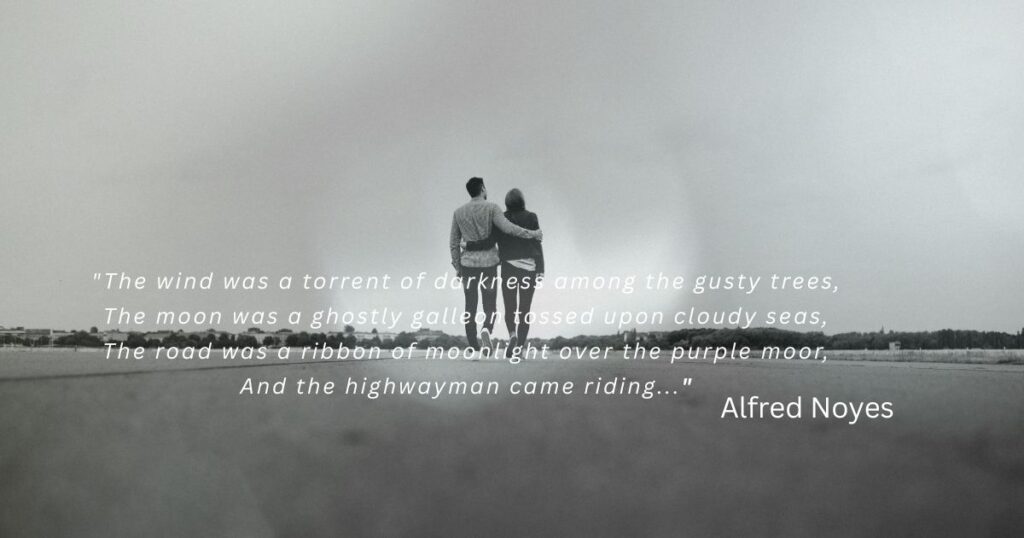
Noyes’s romantic adventure ballad offers English recitation performers an epic storytelling challenge combining atmosphere, character, and dramatic action. The poem’s ballad meter and repetitive refrains create natural performance rhythm while building suspense toward tragic climax.
This narrative competition piece demands vocal variety to distinguish multiple characters while maintaining ballad’s musical qualities throughout extended performance.
The famous opening metaphors establish cinematic atmosphere that skilled performers can enhance through vocal tone and pacing. Advanced reciters create distinct characterizations for the highwayman, Bess, and Tim the ostler while building romantic tension and tragic inevitability.
The repeated phrase “The highwayman came riding” serves as both structural anchor and ominous promise, gaining new meaning as the story progresses from romantic anticipation to desperate rescue attempt. Competition judges recognize the difficulty of maintaining audience engagement throughout this lengthy narrative while preserving its ballad tradition and romantic grandeur.
Dreams by Langston Hughes
“Hold fast to dreams
For if dreams die
Life is a broken-winged bird
That cannot fly…”
Hughes’s compact meditation on aspiration’s importance provides English recitation competitors with powerful imagery concentrated into just eight lines. The poem’s extended metaphors—life as broken-winged bird and barren field—create visual impact while conveying universal message about maintaining hope despite adversity.
This accessible yet profound competition piece works particularly well for performers who can find fresh meaning in familiar wisdom.
Despite its brevity, the poem’s two stanzas offer complete philosophical statement about dreams’ essential role in meaningful existence. Skilled performers emphasize the contrast between vibrant imagery of flight and fertility against broken wings and frozen barrenness. The repetitive structure allows for vocal variation while reinforcing the central message.
Advanced recitation coaches appreciate how Hughes transforms simple vocabulary into profound statement about human resilience and the power of maintaining aspirations even when circumstances seem hopeless.
The Tyger by William Blake
“Tyger Tyger, burning bright,
In the forests of the night;
What immortal hand or eye,
Could frame thy fearful symmetry?”
Blake’s exploration of creation’s dual nature offers English recitation performers an opportunity to grapple with profound theological and philosophical questions through vivid animal imagery. The poem’s repetitive questioning structure builds intellectual and emotional intensity while its strong rhythm and memorable phrases make memorization manageable.
This thought-provoking competition piece rewards performers who can convey both wonder and terror at creation’s mysterious power.
The famous opening and closing stanzas frame a series of increasingly complex questions about divine creation, culminating in the central mystery: “Did he who made the Lamb make thee?” Advanced performers recognize that the tyger represents both natural beauty and destructive power, challenging audiences to consider creation’s paradoxical nature. The poem’s trochaic rhythm creates driving urgency that mirrors the speaker’s growing amazement and concern.
Competition judges appreciate reciters who can balance Blake’s simple vocabulary with complex philosophical implications while maintaining the poem’s sense of awe and questioning.
Crossing the Bar by Alfred Lord Tennyson
“Sunset and evening star,
And one clear call for me!
And may there be no moaning of the bar
When I put out to sea…”
Tennyson’s peaceful meditation on death as journey across life’s threshold provides English recitation competitors with an opportunity to explore mortality through maritime metaphor. Written near the end of the poet’s life, the poem transforms anxiety about death into acceptance and even anticipation of final voyage.
This contemplative competition piece requires emotional maturity and ability to convey serenity rather than morbid preoccupation.
The extended metaphor of death as sailing across harbor bar creates natural performance structure while building toward hopeful conclusion about meeting one’s “Pilot face to face.” Skilled performers emphasize the poem’s peaceful tone while acknowledging the natural sadness of departure from loved ones. The request for “no moaning of the bar” when departing suggests both literal harbor sounds and metaphorical grief that the speaker hopes to minimize.
Advanced recitation judges recognize the difficulty of conveying acceptance of mortality without seeming detached from life’s value or dismissive of natural human attachment to existence.
Jabberwocky by Lewis Carroll
“‘Twas brillig, and the slithy toves
Did gyre and gimble in the wabe:
All mimsy were the borogoves,
And the mome raths outgrabe…”
Carroll’s nonsense masterpiece challenges English recitation performers to create meaning through sound, rhythm, and vocal expression despite largely invented vocabulary. The poem’s narrative structure—preparation, battle, victory, celebration—provides clear dramatic arc while its musical qualities reward performers comfortable with pure vocal play.
This unique competition piece separates reciters who rely heavily on semantic meaning from those who can create atmosphere and story through sound alone.
The famous “Jabberwock” creature and heroic quest provide universal story elements that audiences can follow despite linguistic inventiveness. Advanced performers create distinct vocal characterizations while maintaining Carroll’s playful spirit throughout. The challenge lies in making nonsense words sound natural and meaningful through confident delivery and appropriate emotional coloring.
Competition judges particularly appreciate reciters who can balance whimsical playfulness with genuine narrative tension, proving that effective poetry performance transcends literal comprehension to achieve emotional and atmospheric communication.
The Love Song of J. Alfred Prufrock by T.S. Eliot
“Let us go then, you and I,
When the evening is spread out against the sky
Like a patient etherized upon a table;
Let us go, through certain half-deserted streets…”
Eliot’s modernist exploration of anxiety and paralysis offers advanced English recitation competitors one of the most psychologically complex pieces in the competitive repertoire. The poem’s stream-of-consciousness technique and fragmented structure mirror the speaker’s fractured mental state while building toward profound meditation on modern alienation.
This challenging competition selection demands sophisticated interpretation and ability to maintain audience engagement despite the poem’s difficulty and length.
Prufrock’s internal monologue reveals educated man paralyzed by self-consciousness and fear of social rejection. Expert performers navigate between neurotic self-doubt and moments of lyrical beauty, treating famous lines like “I have measured out my life with coffee spoons” as windows into universal modern experience.
The repeated question “Do I dare?” encapsulates the poem’s central tension between desire and paralysis. Advanced competition judges recognize that this piece requires intellectual maturity and emotional depth far beyond most competitive poetry, rewarding reciters who can make Eliot’s modernist techniques accessible while preserving their psychological authenticity.
She Walks in Beauty by Lord Byron
“She walks in beauty, like the night
Of cloudless climes and starry skies;
And all that’s best of dark and bright
Meet in her aspect and her eyes…”
Byron’s celebration of feminine beauty provides English recitation performers with an opportunity to explore romantic idealization through precise imagery and musical language. The poem’s perfect balance between sensual appreciation and spiritual admiration creates natural performance tension, while its carefully crafted metaphors reward reciters who can paint vivid mental pictures through vocal delivery. This classic romantic competition piece works best for performers who can convey genuine admiration without excessive sentimentality.
The opening comparison to starry night establishes the poem’s central paradox—beauty that combines darkness and light, earthly presence and celestial transcendence. Skilled performers emphasize Byron’s careful word choices while building toward the conclusion that external beauty reflects inner goodness.
The poem’s three stanzas move from physical description through moral reflection to final synthesis of beauty and virtue. Competition judges appreciate reciters who can balance Byron’s romantic enthusiasm with controlled artistic expression, avoiding both mechanical delivery and melodramatic excess.
The Destruction of Sennacherib by Lord Byron
“The Assyrian came down like the wolf on the fold,
And his cohorts were gleaming in purple and gold;
And the sheen of their spears was like stars on the sea,
When the blue wave rolls nightly on deep Galilee…”
Byron’s biblical epic offers English recitation competitors a powerful combination of military spectacle and divine intervention. The poem’s anapestic meter creates galloping rhythm that mirrors both military advance and supernatural destruction, while its vivid imagery provides numerous opportunities for dramatic vocal interpretation.
This dynamic competition piece rewards performers who can balance martial excitement with religious awe while maintaining rhythmic precision throughout.
The narrative structure moves from impressive military display through mysterious overnight destruction to morning revelation of divine judgment. Advanced performers create vocal contrast between Assyrian power and silent divine intervention, building toward the devastating image of warriors found dead “with their eyes to the sun and their hands to their sod.” The poem’s Old Testament source provides familiar story framework while Byron’s romantic treatment adds emotional intensity and visual splendor.
Competition judges recognize the technical challenge of maintaining the poem’s driving rhythm while conveying its spiritual themes and dramatic reversals.
On His Blindness by John Milton
“When I consider how my light is spent,
Ere half my days, in this dark world and wide,
And that one Talent which is death to hide
Lodged with me useless, though my soul more bent…”
Milton’s sonnet wrestling with disability and divine purpose provides English recitation performers with profound meditation on acceptance, service, and faith. The poem’s personal struggle with blindness transforms into universal questions about usefulness, calling, and relationship with the divine. This deeply personal competition piece requires emotional maturity and ability to convey spiritual struggle without religious preaching.
The sonnet’s structure mirrors the speaker’s internal journey from frustration through questioning to peaceful acceptance. Skilled performers emphasize the contrast between anxious questioning in the octave and Patience’s gentle response in the sestet: “They also serve who only stand and wait.” The poem’s theological complexity—exploring predestination, works, and grace—requires careful interpretation to remain accessible while preserving its spiritual depth.
Advanced competition judges appreciate reciters who can make Milton’s personal struggle with blindness resonate with broader human experiences of limitation, purpose, and acceptance.
The Passionate Shepherd to His Love by Christopher Marlowe
“Come live with me and be my love,
And we will all the pleasures prove
That valleys, hills, and fields,
Woods, or steepy mountain yields…”

Marlowe’s pastoral invitation offers English recitation competitors a glimpse into Renaissance courtship through idealized rural imagery.
The poem’s catalog of promised pleasures creates natural performance rhythm while building toward romantic climax, though sophisticated performers recognize the underlying artificiality of its pastoral conventions. This charming competition piece works well for reciters who can balance romantic enthusiasm with subtle acknowledgment of the poem’s idealistic naivety.
Each stanza adds new elements to the shepherd’s seductive argument—from natural beauty through material comfort to personal devotion. Advanced performers treat this as sophisticated literary exercise rather than sincere romantic plea, recognizing Marlowe’s playful exploration of pastoral tradition. The repeated promise “And I will make thee” creates structural unity while building anticipation for the final invitation.
Competition judges appreciate reciters who can convey both the poem’s surface charm and its underlying literary sophistication, making Marlowe’s Renaissance courtship accessible to modern audiences while preserving its historical and artistic context.
Leisure by W.H. Davies
“What is this life if, full of care,
We have no time to stand and stare.
No time to stand beneath the boughs
And stare as long as sheep or cows…”
Davies’s gentle critique of modern hurried existence provides English recitation performers with accessible wisdom about finding time for simple pleasures and natural observation. The poem’s conversational tone and practical examples create immediate audience connection while building toward memorable conclusion about life’s true priorities. This reflective competition piece rewards performers who can convey genuine conviction about slowing down without seeming preachy or unrealistic.
The poem’s structure moves from questioning modern life’s frantic pace through specific examples of missed pleasures to final judgment that such life lacks essential beauty. Skilled performers emphasize the contrast between rushed existence and natural rhythms represented by streams, squirrels, and dancing feet. The famous final couplet “A poor life this if, full of care, / We have no time to stand and stare” provides memorable conclusion that resonates long after performance ends.
Competition judges appreciate reciters who can make Davies’s simple language carry profound meaning about modern priorities and life’s fundamental purposes.
The Village Blacksmith by Henry Wadsworth Longfellow
“Under a spreading chestnut-tree
The village smithy stands;
The smith, a mighty man is he,
With large and sinewy hands…”
Longfellow’s tribute to honest labor offers English recitation competitors an opportunity to celebrate working-class dignity through detailed character portrait. The poem’s narrative structure and descriptive imagery create natural performance opportunities while building toward moral reflection on industry, integrity, and community respect. This character study competition piece works particularly well for performers who can convey admiration for physical labor and moral steadiness.
Each stanza adds details to the blacksmith’s portrait—physical strength, work habits, family devotion, community standing—building comprehensive picture of idealized American craftsman.
Advanced performers recognize that Longfellow presents the blacksmith as democratic hero whose value comes from character rather than social position. The poem’s regular meter and moral clarity make it accessible while providing opportunities for vocal variety in describing different aspects of the smith’s life.
Competition judges appreciate reciters who can balance nostalgic celebration of traditional values with recognition of the poem’s historical moment and social idealism.
Casey at the Bat by Ernest Thayer
“The outlook wasn’t brilliant for the Mudville nine that day;
The score stood four to two, with but one inning more to play,
And then when Cooney died at first, and Barrows did the same,
A pall-like silence fell upon the patrons of the game…”
Thayer’s baseball narrative provides English recitation performers with perfect combination of sports drama, character development, and ironic reversal. The poem’s building suspense and crowd psychology create natural performance opportunities while its famous anticlimax teaches lessons about pride and expectations.
This entertaining competition piece rewards reciters who can create stadium atmosphere while building toward Casey’s devastating strikeout.
The poem’s structure mirrors baseball game tension—early despair, growing hope, climactic confidence, crushing disappointment. Skilled performers create distinct vocal characterizations for crowd, announcer, and Casey himself while maintaining the narrative’s comic tone despite its tragic ending. The famous description of Casey’s arrogance—”There was ease in Casey’s manner as he stepped into his place”—requires careful balance between admiration and criticism.
Competition judges particularly appreciate reciters who can make this quintessentially American poem accessible to diverse audiences while preserving its period charm and moral complexity.
The Ballad of Reading Gaol by Oscar Wilde
“He did not wear his scarlet coat,
For blood and wine are red,
And blood and wine were on his hands
When they found him with the dead…”
Wilde’s prison meditation offers advanced English recitation competitors a powerful exploration of justice, punishment, and human compassion written from personal experience of incarceration. The ballad’s narrative structure and repeated refrains create hypnotic effect while building toward profound statements about suffering’s universal nature.
This challenging competition selection requires emotional maturity and ability to convey both personal anguish and social criticism.
The famous refrain “Yet each man kills the thing he loves” serves as philosophical anchor while the poem explores different forms of destruction—literal murder, emotional betrayal, spiritual death. Expert performers recognize that Wilde transforms personal suffering into universal meditation on guilt, punishment, and redemption. The poem’s length and complexity demand sustained performance skills while its dark themes require careful interpretation to avoid overwhelming audiences.
Advanced competition judges appreciate reciters who can balance Wilde’s bitter experience with his enduring compassion for human weakness and suffering.

Admin of https://aspirenowa.com/. Sharing Touching and Thoughtful Poems for all Hearts. I Believe in Simple Words, Deep Meaning, and Inspiring Emotions through Poetry for Every Reader.
